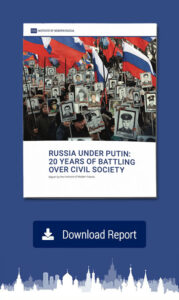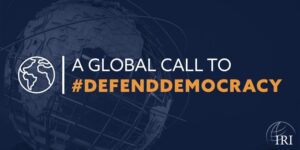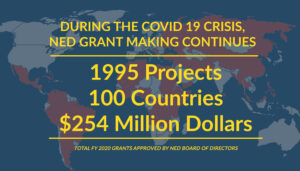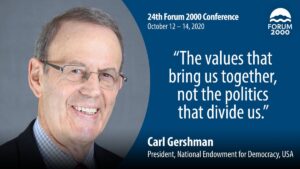
Vladimir Putin’s Kremlin is concerned at the likelihood of a shift in US foreign policy towards advancing democracy and human rights, a leading expert attests.
“One feature of the newly reaffirmed US policy that irritates and worries Putin’s courtiers is the incoming administration’s reinforced emphasis on upholding democratic values and human rights – guidelines set to narrow the space for cynical bargaining and undercut the ‘anti-hegemonic’ posturing that constitute two complementary tracks in Russian foreign policy,” argues
 Democracy-upholding (rather than promotion) will also underpin the reinvigoration of transatlantic relations, so Moscow has to expect diminishing rewards from its game of exploiting the disagreements between the US and its European allies, he writes for Jamestown’s Eurasia Daily Monitor:
Democracy-upholding (rather than promotion) will also underpin the reinvigoration of transatlantic relations, so Moscow has to expect diminishing rewards from its game of exploiting the disagreements between the US and its European allies, he writes for Jamestown’s Eurasia Daily Monitor:
Notably, the next US administration’s stronger condemnation of the police brutality in Belarus, which has not been able to entirely suppress the mass protests against Lukashenka, may encourage the EU to ostracize his regime with greater resolve (Carnegie.ru, November 26). Putin cannot fail to see that Lukashenka has become a liability for Russia’s ties with Belarus, but he is stuck with the “brotherly” embrace of this discredited autocrat.
A commitment to restoring the centrality of democracy in US foreign policy might resonate inside Russia as well; so to prevent this impact, the Russian State Duma (lower chamber of parliament) is developing a set of repressive legislation aimed at individuals branded as “foreign agents,” Baev adds.
 Perhaps the most critical signal a proposed global democracy summit will send is that the U.S. won’t shy away from defending democratic norms under attack from rivals like communist-led China and Vladimir Putin’s Russia, some foreign policy analysts told POLITICO:
Perhaps the most critical signal a proposed global democracy summit will send is that the U.S. won’t shy away from defending democratic norms under attack from rivals like communist-led China and Vladimir Putin’s Russia, some foreign policy analysts told POLITICO:
Daniel Twining, president of the International Republican Institute, urged the Biden team to invite Taiwan to the summit. The breakaway island, which China claims as its own, has a democratic governance system. Twining further called on Biden and his aides to make sure that the summit includes discussion on countering China and Russia on the cyber and tech fronts.
“The subtext is that there’s been competition from the illiberal forces out there in a different direction, and it behooves the United States to get into the contest,” said Derek Mitchell, president of the National Democratic Institute.
 Foreign Policy reports that names floated for the job of USAID administrator in Democratic foreign-policy circles include Liz Schrayer, president and CEO of the U.S. Global Leadership Coalition, a nonprofit group; Frederick Barton, a former senior U.N. envoy and U.S. diplomat in the Obama administration; and Jeremy Konyndyk, a seasoned humanitarian expert who was a senior USAID official during the Obama administration and is a member of the Biden transition’s teams for the State Department and Department of Health and Human Services.
Foreign Policy reports that names floated for the job of USAID administrator in Democratic foreign-policy circles include Liz Schrayer, president and CEO of the U.S. Global Leadership Coalition, a nonprofit group; Frederick Barton, a former senior U.N. envoy and U.S. diplomat in the Obama administration; and Jeremy Konyndyk, a seasoned humanitarian expert who was a senior USAID official during the Obama administration and is a member of the Biden transition’s teams for the State Department and Department of Health and Human Services.
U.S. embassies around the world engage regularly with stakeholders from civil society, the private sector, and the public sector to share information, strengthen collaboration, and support overall efforts to advance human rights, the State Department adds. Its series of recommended best practices and opportunities for engaging with U.S. embassies aims to provide stakeholders with a better understanding of how to work most effectively with embassies to protect human rights.
 The Hamilton Lugar School’s sixth conference on America’s Role in the World will take place virtually Tuesday, December 1 and Wednesday, December 2. The schedule can be found on the conference website and below.
The Hamilton Lugar School’s sixth conference on America’s Role in the World will take place virtually Tuesday, December 1 and Wednesday, December 2. The schedule can be found on the conference website and below.
Strategies for countering the global democratic recession and anti-democratic wave are a focus of the nonpartisan event – a tribute to Rep. Lee H. Hamilton, an exemplar of placing principle over politics for more than 50 years. Special guests include former Secretary of State Madeleine K. Albright, former National Security Advisor Stephen J. Hadley, former Directors of National Intelligence Dan Coats and Lt. Gen. James Clapper, National Endowment for Democracy (NED) President Carl Gershman (above) Rohingya Burmese activist Wai Wai Nu, and PBS Newshour anchor Judy Woodruff.
#ARW6 schedule at-a-glance
Tuesday, December 1 (all times are EST)
- 11–11:45am: Lee Hamilton & Ben Rhodes: A conversation on America’s Role in the World
- 11:45am–12:15pm: The Future of Human Rights & Equality in Myanmar
- 3–4:15pm: From Global Democratic Recession to Anti-Democratic Wave: What the United States Can & Should Do About It
Co-sponsor: National Endowment for Democracy
Wednesday, December 2
- 9:15–10:15am: 9/11 Commission & the Next Four Years
Co-sponsor: The Wilson Center - 10:30–11:30am: The Big Foreign Policy Challenges Facing the Next Administration
Co-sponsors: The Media School at Indiana University, Indiana University Center on Representative Government, Pickering & Rangel Fellows Book Club - 11:45am–12:45pm: The Future of Climate Activism
Co-sponsor: IU Environmental Resilience Institute - 12:45pm: Climate breakouts with students
- 2–3:30pm: Trust & Authenticity in Social Media
Co-sponsor: IU Ethics, Values & Technology Project
Accessing the Conference: The conference will be live streamed. To watch, please visit the conference website: arw.indiana.edu. You can also watch via the Hamilton Lugar School Facebook page. Your audio will be streamed through your computer so be sure to have speakers and/or headphones. How to Ask the Speakers a Question: Questions can be submitted on the conference website. Click “Participate in the Q&A” to submit your question. If watching on Facebook, you can also submit questions via the chat function. Technical Questions: If you have any technical questions, please contact Sean England at sean.p.england@gmail.com. Additional Questions? If you have questions about how to register or how to cancel your registration, contact the Conference Registrar at iuconfs@iu.edu or 812-855-4224.
If you have questions about the program, the schedule, or other matters related to the conference, contact: Janae Cummings at jdcummin@iu.edu. All other conference related questions can be sent to iuc@iu.edu.







